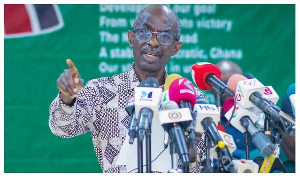In the quest for economic development and gender equality, targeted financial services for women have become a focal point globally. In Ghana, the concept of Women Development Banking (WDB) holds significant potential for empowering women and promoting the growth of small and medium-sized enterprises (SMEs). This article explores the importance of Women Development Banking in enhancing the economic status of Ghanaian women and the critical role it plays in fostering SME development.
The Current Landscape for Women and SMEs in Ghana
Women in Ghana constitute a substantial portion of the labor force and are actively engaged in various economic activities, particularly in the informal sector. Despite their significant contributions, women face numerous challenges, including limited access to finance, education, and business support services. These barriers hinder their ability to start, sustain, and expand their businesses.
SMEs, which form the backbone of the Ghanaian economy, are equally confronted with financing challenges. The limited access to credit, high-interest rates, and stringent collateral requirements pose significant obstacles to their growth and sustainability. Given that many SMEs are owned and operated by women, the intersection of gender and SME financing is particularly critical.
The Concept of Women Development Banking
Women Development Banking refers to financial institutions or specialized banking services that focus on providing tailored financial products and services to women entrepreneurs and women-led businesses. These banks aim to address the specific financial needs of women, promote financial inclusion, and empower women economically.
Key features of Women Development Bank include:
1. Tailored Financial Products:
Offering customized loan products, savings accounts, and investment opportunities that cater to the unique needs of women entrepreneurs.
2. Capacity Building and Training:
Providing business development services, financial literacy programs, and entrepreneurial training to enhance women’s business skills and knowledge.
3. Supportive Networks and Mentorship:
Facilitating access to business networks, mentorship programs, and market linkages to support women’s business growth.
4. Advocacy and Policy Influence:
Engaging in advocacy efforts to influence policies and regulations that promote gender equality and women’s economic empowerment.
The Importance of Women Development Bank for Ghanaian Women
1. Enhanced Access to Finance:
Women Development Banks can bridge the financing gap by offering accessible and affordable credit to women entrepreneurs. By designing loan products with lower collateral requirements and flexible repayment terms, these banks can enable women to secure the capital needed to start and grow their businesses.
2. Financial Inclusion:
Financial exclusion is a significant issue in Ghana, particularly for women in rural areas. Women Development Banks can promote financial inclusion by providing banking services to underserved populations, thereby integrating more women into the formal financial system.
3. Economic Empowerment:
Access to financial resources empowers women to take control of their economic future. With the support of Women Development Banks, women can invest in their businesses, improve their livelihoods, and contribute more significantly to their families and communities.
4. Reduction of Gender Inequality:
By focusing on women’s financial needs, Women Development Banks can help reduce gender disparities in access to finance. This contributes to broader gender equality and supports the achievement of Sustainable Development Goal 5, which aims to achieve gender equality and empower all women and girls.
The Role of Women Development Banking in SME Growth
1. Addressing Financing Constraints:
SMEs in Ghana often struggle with limited access to credit. Women Development Banks can provide SME-specific loan products that cater to the unique challenges faced by small businesses. This can include microloans, working capital loans, and growth capital, which are crucial for business expansion.
2. Capacity Building for SMEs:
Beyond providing finance, Women Development Banks can offer capacity-building services such as business training, financial management workshops, and technical assistance. These services enhance the capabilities of SME owners, enabling them to manage their businesses more effectively.
3. Fostering Innovation and Entrepreneurship:
By supporting women-led SMEs, Women Development Banks can foster a culture of innovation and entrepreneurship. Access to finance and business support encourages women to explore new business ideas, adopt innovative practices, and drive economic growth.
4. Job Creation and Economic Growth:
SMEs are significant job creators in Ghana. By facilitating the growth of women-led SMEs, Women Development Banks contribute to job creation and overall economic development. Empowered women entrepreneurs can create employment opportunities, reduce poverty, and stimulate local economies.
Case Studies and Global Examples
Several countries have successfully implemented Women Development Banking models that can serve as references for Ghana. For example:
1. Bank of Africa Women’s Market Program:
This program, operating in several African countries, provides tailored financial products and services to women entrepreneurs, including loans, savings accounts, and business training. The program has significantly improved women’s access to finance and business development support.
2. Grameen Bank in Bangladesh:
Known for its microfinance model, Grameen Bank has empowered millions of women by providing small loans to support their businesses. The bank’s focus on women has led to improved economic outcomes and social development in Bangladesh.
Women Development Banking is a crucial strategy for empowering Ghanaian women and fostering the growth of SMEs. By addressing the specific financial needs of women entrepreneurs, promoting financial inclusion, and supporting business development, Women Development Banks can drive economic empowerment and contribute to sustainable economic growth. For Ghana to achieve its development goals and promote gender equality, the establishment and support of Women Development Banks must be a priority. Through targeted financial services, capacity building, and advocacy, these banks can transform the economic landscape for women and SMEs in Ghana, creating a more inclusive and prosperous future.
Opinions of Thursday, 18 July 2024
Columnist: Enyonam Adzo Apetorgbor















